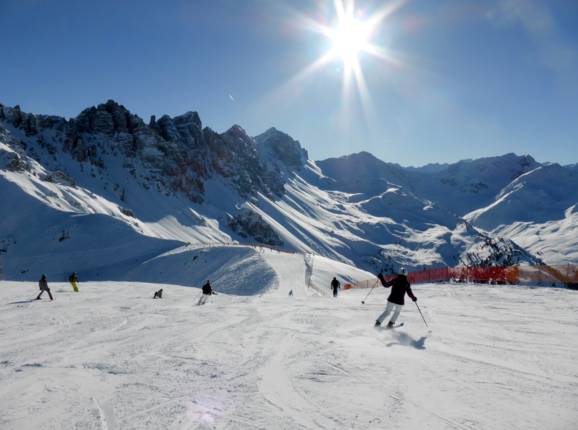Imagine the crisp mountain air filling your lungs, the sound of snow crunching underfoot, and the sight of pristine slopes beckoning. A ski trip embodies the pinnacle of exhilarating adventure that awaits families and children alike. Beyond the physical rush of gliding down wintry landscapes, skiing stands as a paragon of physical activity with a significant, yet often understated, influence on mental health. It merges the raw joy of sport with nature’s tranquil majesty, providing a dual-edged sword against the modern-day stresses that even children are not immune to. This article dives into the heart of these snow-capped mountains to uncover how a ski trip can go beyond mere physical activity, serving as a catalyst for enhancing children’s mental wellbeing. We will carve through the psychological powdery slopes to reveal how these experiences shape young minds, bringing to light the invaluable benefits a ski adventure can bestow upon their growing spirits.
The Thrill of the Slopes: An Overview of Ski Trips
Embarking on a ski trip presents a unique blend of thrill and wonder, especially through the eyes of a child. The fundamental aspects of such an excursion—crisp alpine air, the rush of descending a snowy trail, and the serene beauty of a wintry landscape—converge to create an environment ripe for adventure and exploration. A inspireski trip offers an escape from the routine, a chance to forge unforgettable memories on the slopes.
Children, bundled in vibrant ski gear, can look forward to a smorgasbord of activities; from their first cautious glide on the bunny hills to the triumphant completion of a challenging run. Ski schools and friendly instructors are there to guide their journey, ensuring safety while stoking the flames of newfound passion for the sport. The experience is sprinkled with the joy of snowball fights, the thrill of mastering a new skill, and the warmth of hot chocolate breaks. Each element of the ski trip is carefully crafted to ensure that children and adults alike are not just visitors on the slopes but active participants in the mountain’s daily life, creating an adventure that goes beyond ordinary school life.
Physical Activity & Mental Health
The connection between regular physical activity and enhanced mental health is well-documented, with the benefits being particularly impactful for children. Engaging in physical exercises, such as those experienced on a ski trip, triggers the release of endorphins, often dubbed the body’s ‘feel-good’ hormones. These natural mood lifters play an essential role in reducing stress and anxiety, leading to an elevated sense of happiness and well-being.
During a ski trip, children experience these effects firsthand. As they navigate the slopes, their bodies work vigorously against the resistance of snow, propelling the release of these endorphins. The result is a natural, euphoric high that surpasses the thrill of the activity itself, leaving children feeling jubilant and mentally refreshed after a day on the mountain.
Physical activity is well known for its positive effects on physical health, but it also offers a wealth of benefits for mental wellbeing. Here are some of the key mental benefits that come from regular physical activity:
- Reduces Stress: Exercise increases concentrations of norepinephrine, a chemical that can moderate the brain’s response to stress.
- Boosts Happy Chemicals: Engaging in physical activity releases endorphins, creating feelings of happiness and euphoria.
- Improves Self-Confidence: Regular physical activity can boost self-esteem and improve self-image.
- Decreases Symptoms of Depression and Anxiety: Exercise can reduce symptoms in people suffering from depression and anxiety and may also prevent such conditions from developing in the first place.
- Enhances Brainpower: Various studies suggest that cardiovascular exercise can create new brain cells (a process known as neurogenesis) and improve overall brain performance.
- Sharpens Memory: Regular physical activity boosts memory and the ability to learn new things by increasing the production of cells in the hippocampus responsible for memory and learning.
- Helps with Sleep: Regular physical activity, especially aerobic exercise, can help you fall asleep faster and deepen your sleep.
- Boosts Creativity: A heart-pumping gym session can boost creativity for up to two hours afterwards.
- Provides a Sense of Accomplishment: Meeting physical goals, whether small daily goals or bigger targets like running a 5k, can provide a sense of accomplishment and pride.
- Facilitates Better Coping Strategies: Engaging in exercise can help you cope with stress and challenges in a more effective way.
Learning New Skills & Building Confidence
Mastering the slopes on a ski trip offers more than just physical agility; it’s a journey that can greatly boost a child’s self-esteem and confidence. Each turn mastered, each fall recovered from, and each lift taken higher up the mountain represents a personal challenge overcome. The process of learning to ski is replete with such challenges, fostering resilience and determination. As children learn to navigate the slopes, they acquire skills that stretch far beyond the physical. They learn to face fears, to endure, to push their limits, and to relish the triumph of descent from the once-daunting peaks. A ski trip encapsulates this arc of progression, turning apprehension into capability, and in the process, fosters a deep-rooted sense of accomplishment that can elevate a child’s self-image and spill over into other aspects of their life.
Outdoors & Mental Wellbeing
The outdoors is widely recognised for its mental health benefits, and ski trips provide a perfect opportunity to experience this. Being outside in the mountains helps calm the mind, a concept sometimes called ‘green therapy.’ Fresh mountain air and peaceful snow landscapes work to lessen stress and anxiety, boosting overall mood. For children, the impact is even more significant; the outdoors encourages them to use their imagination, explore, and wonder. Ski trips take kids out of the typical indoor setting, offering a grand natural space that’s both a playground and a classroom, with endless opportunities for mental and emotional growth.

Social Connection & Teamwork on Ski Trips
The social tapestry of a ski trip is woven from the threads of shared experiences, collective challenges, and the joy of shared triumphs. Children on the slopes are naturally encouraged to interact, communicate, and collaborate with peers, enhancing their social skills and forging friendships that can last a lifetime. Whether it’s through group lessons that promote cooperation or ski activities that strengthen student bonds, skiing inherently relies on teamwork. By navigating the slopes together, children learn the value of support and shared effort, laying the groundwork for strong interpersonal skills and a sense of community that can be transformative.
In conclusion, a ski trip offers much more than a break from the daily grind; it is an enriching experience that touches on every facet of a child’s development, particularly their mental wellbeing. Learning to ski builds confidence through skill mastery, while the magnificent outdoor environment acts as a soothing backdrop that can calm and rejuvenate young minds. The communal aspect of skiing promotes teamwork and forges new social connections, rounding out an experience that is as socially rewarding as it is physically exhilarating. As children engage with the challenges and joys of skiing, they also learn valuable life lessons in resilience, determination, and the joys of active living. A ski trip, therefore, is not just an escape to the snow-capped mountains; it’s an investment in a child’s mental and emotional health, promising returns that could last a lifetime.

